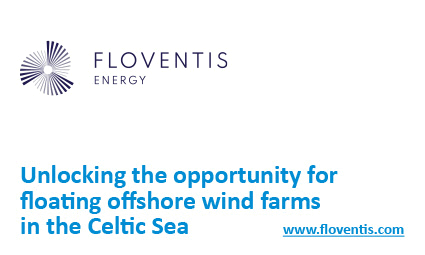The Celtic Sea region offers a huge opportunity to develop large-scale, commercial floating offshore wind and RWE as the largest energy producer and renewables operator in Wales, wants to play a part in its delivery.
In anticipation of this, RWE has commissioned Swansea-based Marine Power Systems (MPS) to develop a project plan for delivering up to 1 gigawatt (GW) of floating wind using the ports ABP Port Talbot and Pembroke Dock for foundation assembly and turbine assembly. In addition, the study will identify what materials and components could be sourced from South Wales and the wider supply chain.
MPS is developing an offshore wind platform solution, called PelaFlex, for industrial scale applications. The partnership will allow RWE to learn more about the foundation technology being developed and how it could be deployed from the region’s ports into the Celtic Sea. The study will build upon collaborations already established this year between RWE, the ports as well as Tata Steel UK, in preparation for the Crown Estate’s Celtic Sea seabed leasing expected to take place next year.
Philippa Powell, RWE Celtic Sea Project Lead, said:
“We are delighted to be working with Marine Power Systems to find solutions for maximising opportunities for the region’s supply chains, which will be so important for local and regional communities. At the same time, the study will test the future capability of our local ports to support the delivery of the multi-billion pound opportunities that the Celtic Sea floating wind opportunity offers. RWE is in an excellent position to help broker relationships between our trusted supply chain partners, such as between MPS, TATA Steel UK and with the local ports. MPS are reaching some exciting milestones in the testing of their floating devices and we also look forward to seeing the results from the testing facilities.”
RWE is preparing to bid into the Crown Estate Celtic Sea seabed leasing round in 2023 where up to 4GW of floating wind will be awarded, with many more gigawatts expected in the future.
In advance of the MPS study, RWE has already signed MoU’s with the two deep water ports in the region (ABP Port Talbot and Pembroke Dock) as well as a co-operation agreement with Tata Steel UK to explore how these facilities may be utilised for Celtic Sea floating wind.
UK based MPS’s solution aims to help increase local content by leveraging existing supply chain capability and enabling a wide range of ports to support deployment. Next year, MPS is deploying its multi-MW PelaFlex project at BiMEP in Bilbao.
Gareth Stockman, CEO at Marine Power Systems said:
“We are delighted to be supporting RWE to help them understand exactly how our unique and flexible floating platform technology can be deployed in the Celtic Sea and how we can leverage local supply chain to do that. Our technology has been designed to optimise local content delivery through a decentralised logistics model, and these benefits help utility scale developers such as RWE minimise costs whilst maximising local economic benefits and accelerating industrial scale farm development. We are looking forward to working with RWE and colleagues at ABP Port Talbot and Milford haven Port Authority as well as RWE supply chain partners such as TATA steel.”
RWE’s ambition is to develop commercial-scale floating projects around the world and is participating in joint industry projects and active involvement in three high-profile demonstration projects in Norway, Spain, and the USA.








